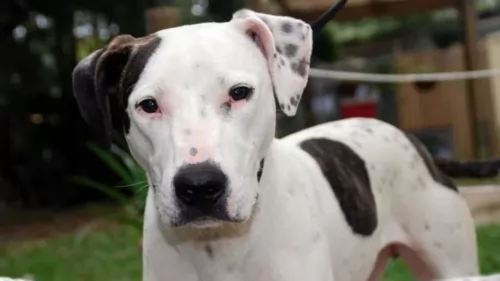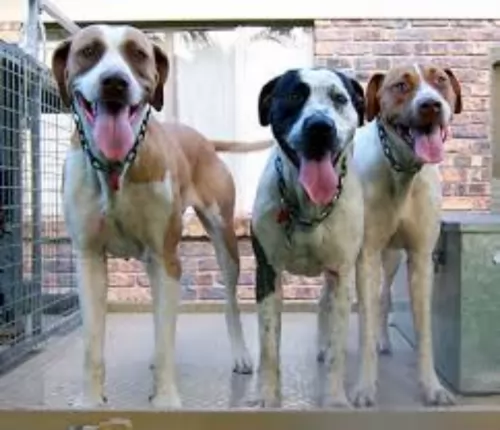 Petzlover
Petzlover Bull Arab is originated from Australia but Chiweenie is originated from United States. Bull Arab may grow 34 cm / 14 inches higher than Chiweenie. Bull Arab may weigh 39 kg / 86 pounds more than Chiweenie. Both Bull Arab and Chiweenie has same life span. Bull Arab may have more litter size than Chiweenie. Bull Arab requires Low Maintenance. But Chiweenie requires High Maintenance
Bull Arab is originated from Australia but Chiweenie is originated from United States. Bull Arab may grow 34 cm / 14 inches higher than Chiweenie. Bull Arab may weigh 39 kg / 86 pounds more than Chiweenie. Both Bull Arab and Chiweenie has same life span. Bull Arab may have more litter size than Chiweenie. Bull Arab requires Low Maintenance. But Chiweenie requires High Maintenance
 In the 1970’s feral pig hunters wanted a dog that could be aggressive in finding and capturing the pigs. The hunters crossed the German Shorthaired Pointer, the Bull Terrier and the Greyhound to develop the Bull Arab. It is believed that the hybrid is at least 50% Bull Terrier. It is also possible that there is some Doberman, Mastiff, Great Dane and/or Pointer in the hybrid as well.
In the 1970’s feral pig hunters wanted a dog that could be aggressive in finding and capturing the pigs. The hunters crossed the German Shorthaired Pointer, the Bull Terrier and the Greyhound to develop the Bull Arab. It is believed that the hybrid is at least 50% Bull Terrier. It is also possible that there is some Doberman, Mastiff, Great Dane and/or Pointer in the hybrid as well.
The job of the Bull Arab is to hunt out the feral pigs, grab one by the ear and hold it until the hunter arrives. They have a strong sense of smell and that is how they find the pigs.
Mike Hodgens, an Australian, developed the hybrid and added some Bloodhound as well to get that ability to smell out the pigs at great distances. They are also capable of catching buffalo and cattle. Some Australians use the breed in cattle or buffalo ranching. They are registered with the DRA or Dog Registry of America, Inc.
 The Chiweenie is a small dog developed in the 1960’s as a hybrid/cross between the Dachshund and the Chihuahua. Due to their small size and big personalities, they are an extremely popular designer breed. They are easy to care for and their personality and activity level is much like the Chihuahua side of the hybrid. The Chiweenie can look like either of its parents if it is first generation. If it is second or third generation it is likely to resemble the parents more as they already look like one of the two breeds. The second and third generations will look like the mix more than either of the originators.
The Chiweenie is a small dog developed in the 1960’s as a hybrid/cross between the Dachshund and the Chihuahua. Due to their small size and big personalities, they are an extremely popular designer breed. They are easy to care for and their personality and activity level is much like the Chihuahua side of the hybrid. The Chiweenie can look like either of its parents if it is first generation. If it is second or third generation it is likely to resemble the parents more as they already look like one of the two breeds. The second and third generations will look like the mix more than either of the originators.
The Chihuahua is the smallest breed of dog in the world and they originated in Mexico. The Daschund is a hunting dog from Germany with a long body and short legs. The Chiweenie is a nice looking cross breed that loves people and is very affectionate. They were developed in the United States.
 Mike Hodgens succeeded in developing a powerful, well built dog. The Bull Arab has a powerful head and muzzle. He has moderate length drop ears and bright eyes that match the color of his coat. His chest is neither shallow nor deep and his back is straight and strong. Their tails are tapered and pointed yet the base is thick. They are a double-coated dog. They can be white with black, tan or liver, flecked or bicolor.
Mike Hodgens succeeded in developing a powerful, well built dog. The Bull Arab has a powerful head and muzzle. He has moderate length drop ears and bright eyes that match the color of his coat. His chest is neither shallow nor deep and his back is straight and strong. Their tails are tapered and pointed yet the base is thick. They are a double-coated dog. They can be white with black, tan or liver, flecked or bicolor.
 A first-generation Chiweenie can look like either of the breeds they are crossed with. However, the second and third generations will have the hybrid look for the most part. No two will look exactly alike however. They have a thin snout that is long on a small, domed head. They can have floppy or pointed ears, eyes that are large and expressive, a moderate tail and small feet. They can vary substantially in their appearances.
A first-generation Chiweenie can look like either of the breeds they are crossed with. However, the second and third generations will have the hybrid look for the most part. No two will look exactly alike however. They have a thin snout that is long on a small, domed head. They can have floppy or pointed ears, eyes that are large and expressive, a moderate tail and small feet. They can vary substantially in their appearances.
 The Bull Arab is intelligent, calm and loyal. Like Pit Bulls in the U.S., the Bull Arab has a reputation for aggression against both people and animals. There is no data to support these claims. They have been used as therapy dogs and companion animals very successfully. They are great with kids and very affectionate. The breed is cited as being used for companion and therapy animals
The Bull Arab is intelligent, calm and loyal. Like Pit Bulls in the U.S., the Bull Arab has a reputation for aggression against both people and animals. There is no data to support these claims. They have been used as therapy dogs and companion animals very successfully. They are great with kids and very affectionate. The breed is cited as being used for companion and therapy animals
 This is an extremely popular hybrid or designer dog because they are so friendly, gentle, loving lapdogs. In addition, they love to play and cuddle. They are great for single or older people. If they live with a family it should be with older kids because younger kids might hurt them. Be careful how rough you play. They are small and can be hurt easily.
This is an extremely popular hybrid or designer dog because they are so friendly, gentle, loving lapdogs. In addition, they love to play and cuddle. They are great for single or older people. If they live with a family it should be with older kids because younger kids might hurt them. Be careful how rough you play. They are small and can be hurt easily.
The Chiweenie is dedicated to their people and extremely loyal. They are also very cautious and can be nervous. They are always watching what else is happening in their environment and they will bark to alert you if they think there is something or someone out of place. They are not quiet dogs. They are great with other small dogs that they are raised with or used to but not with larger dogs, cats or other animals. They are jealous and protective. Train them out of or to avoid resource guarding. They can be stubborn about these things.
They will play constantly if you let them and they are great travel companions, although noises and activity around them does often annoy them. They are also courageous, clever, lovable and happy. Like most toy or small dog breeds you might have a difficult time housebreaking them and crate training is recommended.
 Chiweenies are a pretty healthy crossbreed with their most prominent issue being allergies. At the same time this hybrid might inherit any of the problems of either of their two parental breeds. These conditions might include:
Chiweenies are a pretty healthy crossbreed with their most prominent issue being allergies. At the same time this hybrid might inherit any of the problems of either of their two parental breeds. These conditions might include:
The tendency for this would come from the Chihuahua parental genes and can result in brain damage but normally is not that bad.
The tendency for this would come from the Dachshund parental genes and if your Chiweenie has a long back you will need to be careful of jump and overzealous playing.
 This is a working dog so he needs to eat the right kind of quality dog food. In order to avoid bloat do not feed large meals but rather feed one to two cups of food two to three times a day.
This is a working dog so he needs to eat the right kind of quality dog food. In order to avoid bloat do not feed large meals but rather feed one to two cups of food two to three times a day.
Hunting Accidents – this is the biggest reasons for health problems with the Bull Arab.
These are working dogs that are inactive when not working. They need a lot of exercise if they are not used for hunting. Agility, Tracking and hunting games, and field trials.
 Chiweenies regulate their own food intake, even as puppies. They should be fed twice a day and they are prone to dental issues. Dry food is absolutely recommended.
Chiweenies regulate their own food intake, even as puppies. They should be fed twice a day and they are prone to dental issues. Dry food is absolutely recommended.
In addition to the conditions listed above, the Chiweenie might inherit the issues that affect small dogs most often. This includes:
A sudden drop in blood sugar levels. This can happen if the dog has diabetes and it is unregulated or stress and poor nutrition can also cause it.
These are little dogs with a lot of energy and they burn up a lot of energy. They need to walk every day or have a full-blown play session in the house. They don’t need much space to play in.